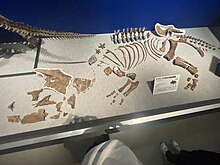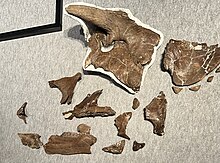| Revision as of 15:40, 11 February 2024 editLyndaship (talk | contribs)Autopatrolled, Extended confirmed users, Page movers132,124 editsm discontinued portalTag: AWB← Previous edit | Revision as of 12:09, 1 March 2024 edit undoFunkMonk (talk | contribs)Autopatrolled, Extended confirmed users, Page movers, File movers, Pending changes reviewers102,815 edits →Discovery and namingTags: citing a blog or free web host RevertedNext edit → | ||
| Line 15: | Line 15: | ||
| ] | ] | ||
| The holotype specimen, NSM PV 24660, is a nearly complete disarticulated skeleton of a moderately-sized subadult. The skeleton preserves, among other elements, numerous elements of the skull, a nearly complete left front- and hindlimb, parts of the pelvis and most of the vertebral column. The specimen was excavated from ]’s “12-020” site, a quarry in the Upper Cretaceous Judith River Formation in Fergus County, Montana. The quarry is located approximately 7 kilometres North-West of the town of Winifred. NSM PV 24660 was collected from rocks of the upper Coal Ridge Member, lying approximately 20 meters below the overlying Bearpaw Formation. Based on a Bayesian geochronological model from a 2022 study by Ramezani ''et al.,'' the horizon from which the holotype was collected is recovered as approximately 75.6 (~75.3-75.9) Ma.<ref name="Furcatoceratops" /><ref>{{Cite journal |last=Ramezani |first=Jahandar |last2=Beveridge |first2=Tegan L. |last3=Rogers |first3=Raymond R. |last4=Eberth |first4=David A. |last5=Roberts |first5=Eric M. |date=2022-09-26 |title=Calibrating the zenith of dinosaur diversity in the Campanian of the Western Interior Basin by CA-ID-TIMS U–Pb geochronology |url=https://www.nature.com/articles/s41598-022-19896-w |journal=Scientific Reports |language=en |volume=12 |issue=1 |pages=16026 |doi=10.1038/s41598-022-19896-w |issn=2045-2322 |pmc=9512893 |pmid=36163377}}</ref> | The holotype specimen, NSM PV 24660, is a nearly complete disarticulated skeleton of a moderately-sized subadult. The skeleton preserves, among other elements, numerous elements of the skull, a nearly complete left front- and hindlimb, parts of the pelvis and most of the vertebral column. The specimen was excavated from ]’s “12-020” site, a quarry in the Upper Cretaceous Judith River Formation in Fergus County, Montana. The quarry is located approximately 7 kilometres North-West of the town of Winifred. NSM PV 24660 was collected from rocks of the upper Coal Ridge Member, lying approximately 20 meters below the overlying Bearpaw Formation. Based on a Bayesian geochronological model from a 2022 study by Ramezani ''et al.,'' the horizon from which the holotype was collected is recovered as approximately 75.6 (~75.3-75.9) Ma.<ref name="Furcatoceratops" /><ref>{{Cite journal |last=Ramezani |first=Jahandar |last2=Beveridge |first2=Tegan L. |last3=Rogers |first3=Raymond R. |last4=Eberth |first4=David A. |last5=Roberts |first5=Eric M. |date=2022-09-26 |title=Calibrating the zenith of dinosaur diversity in the Campanian of the Western Interior Basin by CA-ID-TIMS U–Pb geochronology |url=https://www.nature.com/articles/s41598-022-19896-w |journal=Scientific Reports |language=en |volume=12 |issue=1 |pages=16026 |doi=10.1038/s41598-022-19896-w |issn=2045-2322 |pmc=9512893 |pmid=36163377}}</ref> | ||
| The holotype is currently housed at the ] in Tsukuba, Japan, and was named as a new genus and species of ceratopsid in 2023. The generic name, ''Furcatoceratops'', comes from the Latin ''furcatus'', meaning "forked", and the Greek ''ceratops'' meaning "horned face". The specific name, ''elucidans'', is Latin for "enlightening".<ref name="Furcatoceratops" /> | The holotype is currently housed at the ] in Tsukuba, Japan, and was named as a new genus and species of ceratopsid in 2023. The generic name, ''Furcatoceratops'', comes from the Latin ''furcatus'', meaning "forked", and the Greek ''ceratops'' meaning "horned face". The specific name, ''elucidans'', is Latin for "enlightening".<ref name="Furcatoceratops" /> Before its formal publication, it had been referred to as ''Maltaceratops hammondorum''.<ref>{{cite web |title=Research |url=https://dinoresearch.wordpress.com/research/ |website=Dr. Michael J Ryan |access-date=1 March 2024 |language=en |date=17 February 2010}}</ref> | ||
| == Classification == | == Classification == | ||
Revision as of 12:09, 1 March 2024
Extinct genus of dinosaurs
| Furcatoceratops Temporal range: Campanian ~75.9–75.3 Ma PreꞒ Ꞓ O S D C P T J K Pg N ↓ | |
|---|---|

| |
| Skeletal mount of F. elucidans exhibited at a limited exhibition event in the National Museum of Nature and Science, Tokyo | |
| Scientific classification | |
| Domain: | Eukaryota |
| Kingdom: | Animalia |
| Phylum: | Chordata |
| Clade: | Dinosauria |
| Clade: | †Ornithischia |
| Family: | †Ceratopsidae |
| Subfamily: | †Centrosaurinae |
| Tribe: | †Nasutoceratopsini |
| Genus: | †Furcatoceratops Ishikawa et al., 2023 |
| Type species | |
| †Furcatoceratops elucidans Ishikawa et al., 2023 | |
Furcatoceratops (meaning "forked horned face") is a genus of centrosaurine ceratopsid dinosaur from the Late Cretaceous Judith River Formation of Montana. The type species is Furcatoceratops elucidans.
Discovery and naming

The holotype specimen, NSM PV 24660, is a nearly complete disarticulated skeleton of a moderately-sized subadult. The skeleton preserves, among other elements, numerous elements of the skull, a nearly complete left front- and hindlimb, parts of the pelvis and most of the vertebral column. The specimen was excavated from Triebold Paleontology Incorporated’s “12-020” site, a quarry in the Upper Cretaceous Judith River Formation in Fergus County, Montana. The quarry is located approximately 7 kilometres North-West of the town of Winifred. NSM PV 24660 was collected from rocks of the upper Coal Ridge Member, lying approximately 20 meters below the overlying Bearpaw Formation. Based on a Bayesian geochronological model from a 2022 study by Ramezani et al., the horizon from which the holotype was collected is recovered as approximately 75.6 (~75.3-75.9) Ma.
The holotype is currently housed at the National Museum of Nature and Science in Tsukuba, Japan, and was named as a new genus and species of ceratopsid in 2023. The generic name, Furcatoceratops, comes from the Latin furcatus, meaning "forked", and the Greek ceratops meaning "horned face". The specific name, elucidans, is Latin for "enlightening". Before its formal publication, it had been referred to as Maltaceratops hammondorum.
Classification


In the 2023 study that first described the animal, Furcatoceratops was included in a phylogenetic analysis with other ceratopsian dinosaurs and found to nestle within the clade Nasutoceratopsini. Other members of this clade of early branching centrosaurines include Avaceratops and Nasutoceratops, both also hailing from the Campanian of the United States.
| |||||||||||||||||||||||||||||||||||||||||||||||||||||||||||||||||||||||||||||||||||||||||||||||||||||||||||||||||||||||||||||||||||||
Paleoenvironment
The Judith River Formation has produced the remains of several dinosaurs, several of which have been recovered in the early days of paleontology, as well as others identified more recently. Among others, Furcatoceratops coexisted with fellow ceratopsids Avaceratops, Medusaceratops, and Spiclypeus, the hadrosaur Brachylophosaurus, the ankylosaur Zuul, the tyrannosaur Daspletosaurus, and the giant alligatoroid Deinosuchus.
References
- ^ Ishikawa, H.; Tsuihiji, T.; Manabe, M. (2023). "Furcatoceratops elucidans, a new centrosaurine (Ornithischia: Ceratopsidae) from the upper Campanian Judith River Formation, Montana, USA". Cretaceous Research. 105660. doi:10.1016/j.cretres.2023.105660.
- Ramezani, Jahandar; Beveridge, Tegan L.; Rogers, Raymond R.; Eberth, David A.; Roberts, Eric M. (2022-09-26). "Calibrating the zenith of dinosaur diversity in the Campanian of the Western Interior Basin by CA-ID-TIMS U–Pb geochronology". Scientific Reports. 12 (1): 16026. doi:10.1038/s41598-022-19896-w. ISSN 2045-2322. PMC 9512893. PMID 36163377.
- "Research". Dr. Michael J Ryan. 17 February 2010. Retrieved 1 March 2024.
- Trexler, David; Murphy, Nate; Thompson, Mark (June 2007). ""Leonardo," a Mummified Brachylophosaurus (Ornithischia: Hadrosauridae) from the Judith River Formation of Montana". In Carpenter, Kenneth (ed.). Horns and Beaks. IU Office of Scholarly Publishing Herman B Wells Library E350 1320 E 10th Street E4 Bloomington, IN 47405-3907: Indiana University Press. pp. 117–133.
{{cite book}}: CS1 maint: location (link) - Ryan, Michael J.; Russell, Anthony P., and Hartman, Scott. (2010). "A New Chasmosaurine Ceratopsid from the Judith River Formation, Montana", In: Michael J. Ryan, Brenda J. Chinnery-Allgeier, and David A. Eberth (eds), New Perspectives on Horned Dinosaurs: The Royal Tyrrell Museum Ceratopsian Symposium, Indiana University Press, 656 pp. ISBN 0-253-35358-0.
- Fowler, Denver Warwick (2017-11-22). "Revised geochronology, correlation, and dinosaur stratigraphic ranges of the Santonian-Maastrichtian (Late Cretaceous) formations of the Western Interior of North America". PLOS ONE. 12 (11): e0188426. Bibcode:2017PLoSO..1288426F. doi:10.1371/journal.pone.0188426. ISSN 1932-6203. PMC 5699823. PMID 29166406.
- Schwimmer, David (2002). King of the Crocodylians: The Paleobiology of Deinosuchus. 601 North Morton Street, Bloomington, IN: Indiana University Press. p. 200.
{{cite book}}: CS1 maint: location (link) - Carr, Thomas D. (2018). "Significant geographic range extension for the sympatric tyrannosaurids Albertosaurus libratus and Daspletosaurus torosus from the Judith River Formation (Late Campanian) of northern Montana" (PDF). Journal of Vertebrate Paleontology. 38 (Supplement 1): 102.
This article related to ceratopsian dinosaurs is a stub. You can help Misplaced Pages by expanding it. |



